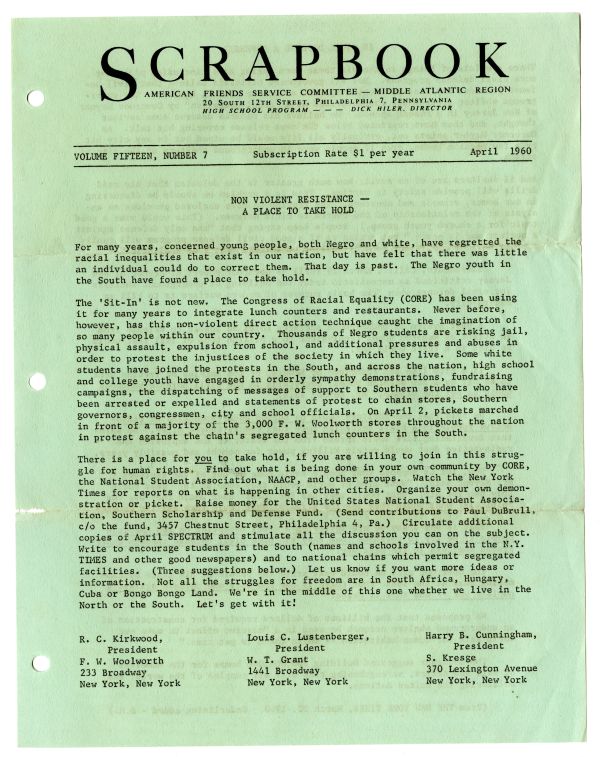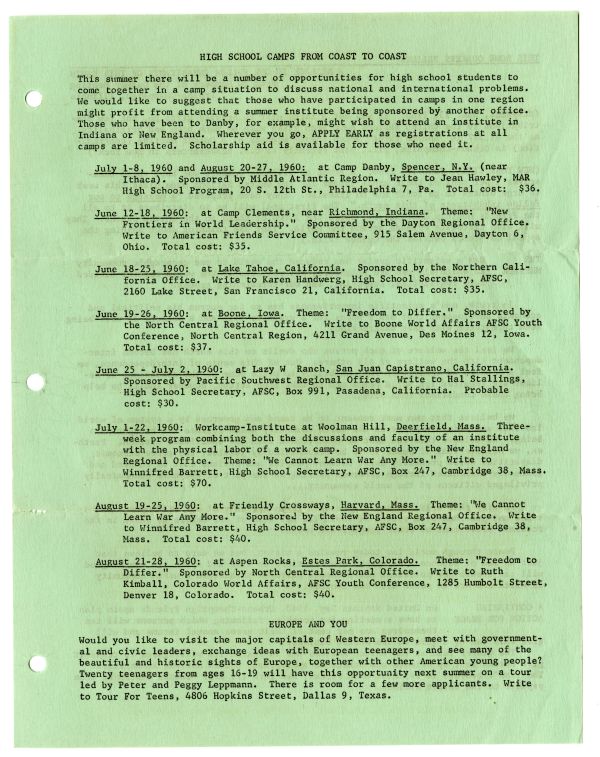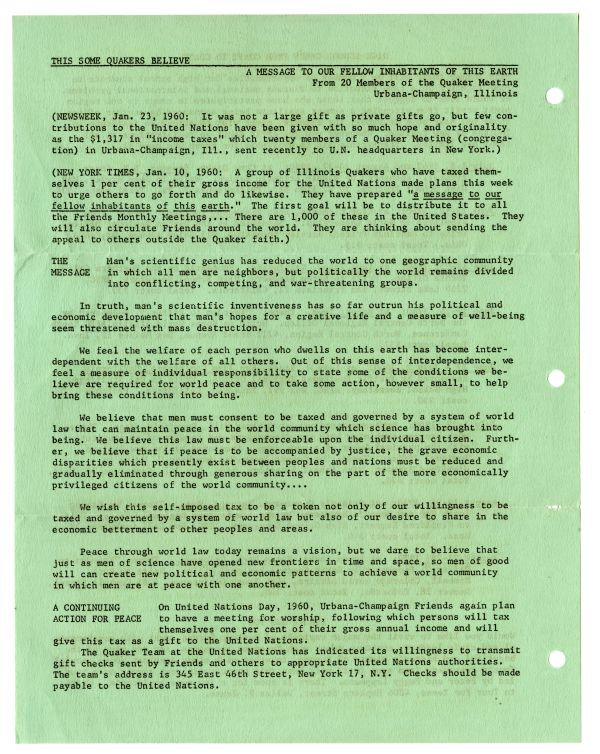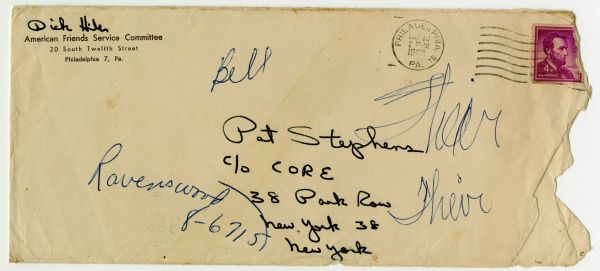Transcript
SCRAPBOOK
AMERICAN FRIENDS SERVICE COMMITTEE - MIDDLE ATLANTIC REGION
20 SOUTH 12TH STREET, PHILADELPHIA 7, PENNSYLVANIA
HIGH SCHOOL PROGRAM - - - DICK HILER, DIRECTOR
VOLUME FIFTEEN, NUMBER 7
Subscription Rate $1 per year
April 1960
[NON-VIOLENT] RESISTANCE - A PLACE TO TAKE HOLD
For many years, concerned young people, both Negro and white, have regretted the racial inequalities that exist in our nation, but have felt that there was little an individual could do to correct them. That day is past. The Negro youth in the South have found a place to take hold.
The 'Sit-In' is not new. The Congress of Racial Equality (CORE) has been using it for many years to integrate lunch counters and restaurants. Never before, however, has this non-violent direct action technique caught the imagination of so many people within our country. Thousands of Negro students are risking jail, physical assault, expulsion from school, and additional pressures and abuses in order to protest the injustices of the society in which they live. Some white students have joined the protests in the South, and across the nation, high school and college youth have engaged in orderly sympathy demonstrations, fundraising campaigns, the dispatching of messages to support to Southern students who have been arrested or expelled and statements of protest to chain stores, Southern governors, congressmen, city and school officials. On April 2, pickets marched in front of a majority of the 3,000 F. W. Woolworth stores throughout the nation in protest against the chain's segregated lunch counters in the South.
There is a place for you to take hold, if you are willing to join in this struggle for human rights. Find out what is being done in your own community by CORE, the National Student Association, NAACP, and other groups. Watch the New York Times for reports on what is happening in other cities. Organize your own demonstration or picket. Raise money for the United States National Student Association, Southern Scholarship and Defense Fund. (Send contributions to Paul DuBrull, c/o the fund, 3457 Chesnut Street, Philadelphia 4, Pa.) Circulate additional copies of April SPECTRUM and stimulate all the discussion you can on the subject. Write to encourage students in the South (names and schools involved in the N.Y. Times and other good newspapers) and to the national chains which permit segregated facilities. (Three suggestions below.) Let us know if you want more ideas or information. Not all the struggles for freedom are in South Africa, Hungary, Cuba or Bongo Bongo Land. We're in the middle of this one whether we live in the North or the South. Let's go with it!
R. C. Kirkwood, President
F. W. Woolworth
233 Broadway
New York, New York
Louis C. Lustenberger, President
W. T. Grant
1441 Broadway
New York, New York
Harry B. Cunningham, President
S. Kresge
370 Lexington Avenue
New York, New York
IS CIVIL DEFENSE A DEFENSE?
There are lots of things in the air these warm spring days, including plans for more civil defense programs. Not all government officials believe that Civil Defense provides any real protection against a nuclear attack, however. The underground shelter program was characterized as a "cruel deception" by Governor Meyner of New Jersey in a recent speech. We believe his remarks deserve some serious thought, and thus have reprinted below the news release covering his talk. As Governor Meyner points out, virtually all life would be wiped out in any city hit by a few megaton bombs, even if people were in underground shelters at the time of attack.
And if shelters are of no avail, how much greater is the delusion that air raid drills will provide safety in wartime. This is a problem we should be discussing in our homes, schools and churches. The reprint we have enclosed provides an analysis of the relationship of the church to civil defense. (This would make a good topic for a church youth group.) People keep saying that "the only defense against a nuclear war is peace," but acting as if a good civil defense program will really protect us. As people are fond of telling pacifists, "Let's be realistic!"
Sacramento, Calif., March 19 (UPI) -- Governor Robert E. Meyner of New Jersey criticizes as unrealistic today the building of the underground shelters for civil defense when "the basic purpose of modern warfare is to kill an entire city."
A vast system of underground shelters holds no answer to defense from an attack of megaton bombs (equivalent to a million tons of TNT) that would be used in a third world war.
"If a city like San Fransisco or Neward, or Los Angeles or Trenton were to be hit by a few megaton bombs," everything in the civil defense handbook would go out the window," Mr. Meyner said.
He said that the shelters would be buried under mountains of radioactive rubble in a blast spreading more than twenty square miles. He said that devastating fire would spread from the center of the explosion and [radioactive] dust would retain killing power for months and possibly years.
"Now, let us suppose that people could come up out of the shelters," Mr. Meyner said. "What kind of world would they come up to? What would they use for air? What would they use for food? What would they use for hospitals? What would they use for streets? What would they use for people?
"That is why i say we are fostering a cruel deception on the American people if we try to persuade them they can have civil defense through underground in shelters in the next war."
The Governor said he could best serve the people of his state by hammering away at the idea "that there is one and only one defense against a nuclear war -- and that is peace."
He proposed that the billions of dollars required for construction of an underground shelter network be used in a "massive effort to make our world safe for human habitation -- while there is yet time."
The Governor suggested building 200,000,000 homes for the homeless of Asia and Africa, strengthening ties with all peoples of the world, and bolstering the United Nations.
(From THE NEW YORK TIMES, March 20, 1960. Underlining added - D.H.)
HIGH SCHOOL CAMPS FROM COAST TO COAST
This summer there will be a number of opportunities for high school students to come together in a camp situation to discuss national and international problems. We would like to suggest that those who have participated in camps in one region might profit from attending a summer institute being sponsored by another office. Those who have been to Danby, for example, might wish to attend an institute in Indiana or New England. Wherever you go, APPLY EARLY as registrations at all camps are limited. Scholarship aid is available for those who need it.
July 1-8, 1960 and August 20-27, 1960: at Camp Danby, Spencer, N.Y. (near Ithaca). Sponsored by Middle Atlantic Region. Write to Jean Hawley, MAR High School Program, 20 S. 12th., Philadelphia 7, Pa. Total cost: $36.
June 12-18, 1960: at Camp Clements, near Richmond, Indiana. Theme: "New Frontiers in World Leadership." Sponsored by the Dayton Regional office. Write to American Friends Service Committee, 915 Salem Avenue, Dayton 6, Ohio. Total cost: $35.
June 18-25, 1960: at Lake Tahoe, California. Sponsored by the Northern California Office. Write to Karen Handwerg, High School Secretary, AFSC, 2160 Lake Street, San Fransisco 21, California. Total cost: $35.
June 19-26, 1960; at Boone, Iowa. Theme: "Freedom to Differ." Sponsored by the North Central Regional Office. Write to Boone World Affairs AFSC Youth Conference, North Central Region, 4211 Grand Avenue, Des Moines 12, Iowa. Total cost: $37.
June 25-July 2, 1960; at Lazy W Ranch, San Juan Capistrano, California. Sponsored by Pacific Southwest Regional Office. Write to Hal Stallings, High School Secretary, AFSC, Box 991, Pasadena, California. Probably cost: $30.
July 1-22, 1960; Workcamp-Institute at Woolman Hill, Deerfield, Mass. Three-week program combining both the discussions and faculty of an institute with the physical labor of a work camp. Sponsored by the New England Regional Office. Theme: "We Cannot Learn War Any More." Write to Winnifred Barrett, High School Secretary, AFSC, Box 247, Cambridge 38, Mass. Total cost: $70.
August 19-25, 1960: at Friendly Crossways, Harvard, Mass. Theme: "We Cannot Learn War Any More." Sponsored by the New England Regional Office. Write to Winnifred Barrett, High School Secretary, AFSC, Box 247, Cambridge 38, Mass. Total cost: $40.
August 21-28, 1960: at Aspen Rocks, Estes Park, Colorado. Theme: "Freedom to Differ." Sponsored by North Central Regional Office. Write to Ruth Kimball, Colorado World Affairs, AFSC Youth Conference, 1285 Humbolt Street, Denver 18, Colorado. Total cost:40.
EUROPE AND YOU
Would you like to visit the major capitals of Western Europe, meet with governmental and civic leaders, exchange ideas with European teenagers, and see many of the beautiful and historic sights of Europe, together with other American young people? Twenty teenagers from ages 16-19 will have this opportunity next summer on a tour led by Peter and Peggy Leppmann. There is room for a few more applicants. Write to Tour For Teens, 4806 Hopkins Street, Dallas 9, Texas.
THIS SOME QUAKERS BELIEVE
A MESSAGE TO OUR FELLOW INHABITANTS OF THIS EARTH
From 20 Members of the Quaker Meeting
Urbana-Champaign, Illinois
(NEWSWEEK, Jan. 23, 1960: It was not a large gift as private gifts go, but few contributions to the United Nations have been given with so much hope and originality as the $1,317 in "income taxes" which twenty members of a Quaker Meeting (congregation) in Urbana-Champaign, Ill., sent recently to U.N. headquarters in New York.)
(NEW YORK TIMES, Jan. 10, 1960P: A group of Illinois Quakers who have taxed themselves 1 [percent] of their gross income for the United Nations made plans this week to urge others to go forth and do likewise. They have prepared "a message to our fellow inhabitants of this earth." The first goal will be to distribute it to all the Friends Monthly Meetings,... There are 1,000 of these in the United States. They will also circulate Friends around the world. They are thinking about sending the appeal to others outside the Quaker faith.)
THE MESSAGE Man's scientific genius has reduced the world to one geographic community in which all men are neighbors, but politically the world remains divided into conflicting, competing, and war-threatening groups.
In truth, man's scientific inventiveness has so far outrun his political and economic development that man's hopes for a creative life and a measure of well-being seems threatened with mass destruction.
We feel the welfare of each person who dwells on this earth has become interdependent with the welfare of all others. Out of this sense of interdependence, we feel a measure of individual responsibility to state some of the conditions we believe are required for world peace and take some action, however small, to help bring these conditions into being.
We believe that men must consent to be taxed and governed by a system of world laws that can maintain peace in the world community which science has brought into being. We believe this law must be enforceable upon the individual citizen. Further, we believe that if peace is to be accompanied by justice, the grave economic disparities which presently exist between peoples and nations must be reduced and gradually eliminated through generous sharing on the part of the more economically privileged citizens of the world community....
We wish this self-imposed tax to be a token not only of our willingness to be taxed and governed by a system of world law but also of our desire to share in the economic betterment of other peoples and areas.
Peace through world law today remains a vision, but we dare to believe that just as men of science have opened new frontiers in time and space, so men of good will can create new political and economic patterns to achieve a world community in which men are at peace with one another.
A CONTINUING ACTION FOR PEACE On United Nations Day, 1960, Urbana-Champaign Friends again plan to have a meeting for worship, following which persons will tax themselves one [percent] of their gross annual income and will give this tax as a gift to the United Nations.
The Quaker Team at the United Nations has indicated its willingness to transmit gift checks sent by Friends and others to appropriate United Nations authorities. The team's address is 345 East 46th Street, New York 17, N.Y. Checks should be made payable to the United Nations.
Rick Hiler
American Friends Service Committee
20 South Twelfth Street
Philadelphia 7, Pa.
Pat Stephens
c/o CORE
38 Park Row
New York 38
New York




 Listen: The Assorted Selections Program
Listen: The Assorted Selections Program


